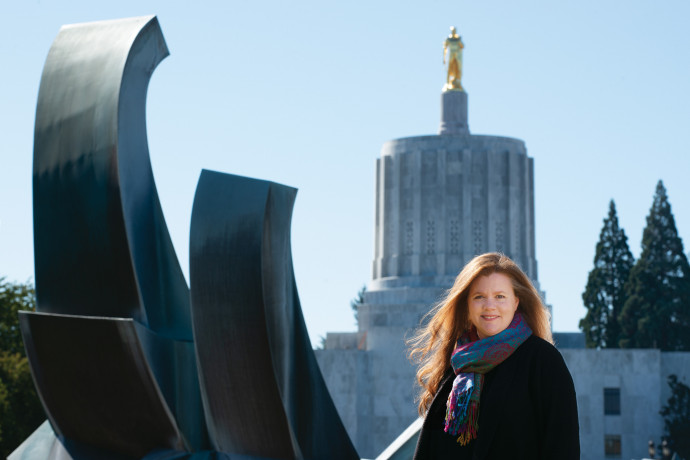Family Politics
As CEO of the Center for Parental Leave Leadership, Amy Beacom BA ’94 fights to make supported parental leave a reality for working parents everywhere.
by Daniel F. Le Ray

Credit: Robert Reynolds
Before becoming a parent, Amy Beacom BA ’94 was pursuing her doctorate in organizational psychology, leadership, and applied anthropology at Columbia University.
She was also consulting for some of the world’s biggest brands on executive coaching and women’s leadership.
After her first child was born, she was still a driven, career-oriented executive. However, juggling a new baby with the demands of work opened her eyes to a whole new set of issues. As Beacom recalls: “I realized that we had been completely missing one of the most important and impactful times in any person’s personal and professional life. So going forward what I chose to do was focus my work on parental leave. It’s where I felt I could have the greatest impact on the largest number of issues.”
Nearly 13 years later, this revelation is still central to her work. As founder and CEO of the Portland-based Center for Parental Leave Leadership (CPLL), Beacom helps businesses manage the transitions surrounding parental leave and advises them on culture change efforts and crafting new policies—ones that foster employee loyalty by creating a positive environment for working parents.
When asked why paid parental leave is so important, Beacom is clear: “Our families are in crisis, and if our working parents cannot sustainably work, then our companies don’t have workers.”
CPLL’s clients are companies, not moms and dads. This is because Beacom believes that new parents aren’t the problem—the system is. “By working on changing the cultures within companies, we’re able to create sustainable change for new parents and their managers,” Beacom says.
This August, Oregon Governor Kate Brown JD ’85 signed into law a new family and medical leave act. One of the most inclusive in the country, the Oregon Family Leave Act provides up to 12 weeks of paid leave for new parents and ensures their job will be there for them when they return. The law makes Oregon one of only a handful of states in the nation to guarantee paid parental leave.
“It was really a bipartisan solution,” says Beacom, who supported lead advocacy organization Family Forward by attending bill sessions, rallying voters to write to their representatives, and bringing businesses into the discussion.
Beacom is no stranger to politics. In fact, she had intended to major in the subject until her senior year. At the last minute, she switched to sociology/anthropology with a minor in gender studies.
“What was disheartening to me about politics was that, often, the people were lost in the process,” she recalls. “What I’ve been able to do in my work is bring the people back to the center of the process and work both at the policy level and the practice level.”
CPLL’s first challenge was making parental leave a topic of conversation.

“For many years, taking leave after the birth of a baby was something that the mom did, not the dad. The mom was expected to return to the office, be the same person, and fit right back in,” says Beacom. But if companies don’t support returning mothers—and now dads—“they’re not going to be able to stay, and they’re going to be forced out of the economic machine of our country.”
Beacom argues that when businesses do it right, “they’re not only gaining lifetime employees through loyalty and appreciation, they’re actually growing their leadership pipeline and investing in the development of those new parents.”
Sometimes, CPLL’s role is squarely on the practice side: coaching managers on how to handle conversations surrounding leave or giving them strategies to ease an employee’s return to the workplace, for example. But in other cases, Beacom is charged with helping craft new policies from scratch.
Her organization has had success locally and internationally. Working with tech giant Microsoft, CPLL created an employee-manager-aligned training program related to parental leave that is now used in 80 countries worldwide. At home in Portland, sustainable engineering firm PAE sought out Beacom’s expertise when creating a first-of-its-kind staff wellness policy, which offers all employees—regardless of seniority or gender—six weeks’ leave at 100 percent pay to care for a new child, themselves, or a loved one.
PAE’s Chief People Officer Shiloh Butterworth explains some of the rationale behind the policy: “We’d seen the struggles caused by caregiving and employees dealing with their own serious health conditions, and we felt it was important we didn’t add to employees’ burdens. Having loyal, engaged employees and using wellness leave as a talent attraction tool has helped us grow exponentially over the last three years.”
Beacom adds, “PAE realized that they wanted not only to create sustainable buildings, but also a sustainable work environment for their employees.”
CPLL is planning to grow its services in the near future, adding workplace postpartum mental health assessments, a tech platform and an expansion of its coaching programs. Beacom credits much of her success today to her time as an undergraduate.
“I left Lewis & Clark with an expanded view of what was possible, with confidence in my own efficacy and with a sense of hope that whatever I did could impact people beyond myself for the better,” she says.
And as new paid-leave bills pop up around the country, her advice to companies in Oregon and beyond is the same: “Get ahead, do it now, reap the benefits of being the first folks to focus on working parents. But remember, policy is only half the solution. Policies can only succeed with thoughtful implementation.”
Daniel F. Le Ray is an award-winning freelance writer and editor based in eastern Washington state.
More L&C Magazine Stories
Lewis & Clark Magazine is located in McAfee on the Undergraduate Campus.
MSC: 19
email magazine@lclark.edu
voice 503-768-7970
fax 503-768-7969
The L&C Magazine staff welcomes letters and emails from readers about topics covered in the magazine. Correspondence must include your name and location and may be edited.
Lewis & Clark Magazine
Lewis & Clark
615 S. Palatine Hill Road MSC 19
Portland OR 97219

